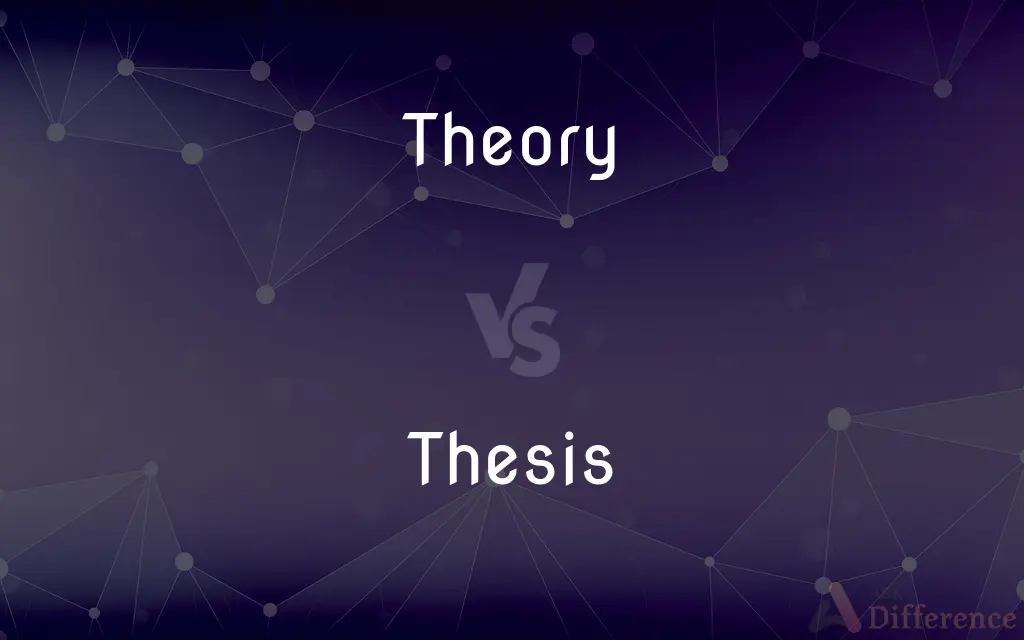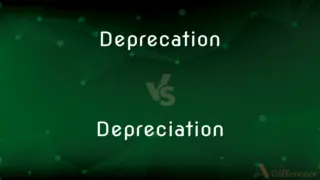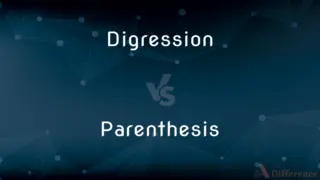Theory vs. Thesis — What's the Difference?
Edited by Tayyaba Rehman — By Urooj Arif — Updated on March 15, 2024
Theory refers to system of ideas intended to explain something, based on general principles independent of the thing to be explained, while thesis is statement or theory that is put forward as premise to be maintained or proved, part of academic work.

Difference Between Theory and Thesis
Table of Contents
ADVERTISEMENT
Key Differences
A theory is a well-substantiated explanation of some aspect of the natural world that is acquired through the scientific method and repeatedly tested and confirmed through observation and experimentation. On the other hand, a thesis is a lengthy piece of writing based on the author's research and submitted as part of a university degree or professional qualification, presenting the author's research and findings.
While theories are formulated to explain, predict, and understand phenomena and, in many cases, to challenge and extend existing knowledge within the limits of critical bounding assumptions, theses are focused on a specific point of view or argument that the author is trying to prove, often contributing to the academic field by offering new insights or perspectives.
Theories are more general and abstract, aiming to provide a framework that can explain a wide range of phenomena within a certain domain. In contrast, a thesis is usually more specific, targeting a particular question or problem and is typically confined to the academic or professional context in which it is presented.
The development of a theory often involves the collective effort of many scientists over years or even decades, building on existing knowledge, data, and research. Meanwhile, a thesis is typically the work of a single individual, reflecting a segment of their academic or professional journey and contributing to a particular field of study.
Theories and theses serve different purposes in the realm of knowledge and inquiry. Theories seek to offer explanations that can be applied across various situations and are open to testing and refutation. Theses, however, aim to make a specific, original contribution to the field, demonstrating the author’s ability to conduct comprehensive research and articulate their findings.
ADVERTISEMENT
Comparison Chart
Purpose
To explain, predict, and understand phenomena
To present research findings and argue in support of a specific viewpoint
Scope
Broad, aiming to apply to general phenomena
Narrow, focused on a specific research question or problem
Origin
Developed through scientific method, observation, and experimentation
Result of individual research, often for academic degrees
Contribution
Extends existing knowledge, offering frameworks for understanding
Provides specific insights, contributing to a field with new data or perspectives
Validation
Through repeated testing and confirmation
Through peer review and defense in academic context
Authors
Collective effort of the scientific community
Usually a single individual, the student or researcher
Context
Applies across various situations and fields
Confined to academic or professional context
Format
Expressed as principles, laws, or hypotheses
Lengthy document with methodology, analysis, and conclusions
Compare with Definitions
Theory
They aim to explain the 'why' and 'how' of natural phenomena.
Plate tectonics theory explains the movement of Earth's lithospheric plates.
Thesis
A thesis is a detailed academic document presenting research findings.
Her thesis explored the impact of social media on consumer behavior.
Theory
A theory is a well-supported explanation of phenomena that has been repeatedly tested.
Einstein's theory of relativity revolutionized physics by explaining how time and space interact.
Thesis
Theses often pave the way for future research.
The findings in the thesis opened new avenues for investigating genetic markers in diseases.
Theory
They are developed through the accumulation and analysis of evidence.
The germ theory of disease identifies microorganisms as the cause of many illnesses.
Thesis
Theses contribute to academic fields by offering fresh insights.
The thesis provided evidence supporting new therapeutic approaches in psychology.
Theory
Theories are fundamental to scientific progress, providing a basis for predictions.
The theory of evolution by natural selection underpins modern biology.
Thesis
It argues in favor of a specific point of view based on research.
His thesis proposed a new technique for data encryption.
Theory
Theories are subject to revision based on new evidence.
Quantum theory adjusted our understanding of atomic and subatomic particles.
Thesis
They undergo rigorous evaluation by academic peers.
The thesis defense was successful, earning the candidate his PhD.
Theory
A theory is a rational type of abstract thinking about a phenomenon, or the results of such thinking. The process of contemplative and rational thinking is often associated with such processes as observational study or research.
Thesis
A thesis, or dissertation (abbreviated diss.), is a document submitted in support of candidature for an academic degree or professional qualification presenting the author's research and findings. In some contexts, the word "thesis" or a cognate is used for part of a bachelor's or master's course, while "dissertation" is normally applied to a doctorate.
Theory
A set of statements or principles devised to explain a group of facts or phenomena, especially one that has been repeatedly tested or is widely accepted and can be used to make predictions about natural phenomena.
Thesis
A proposition that is maintained by argument.
Theory
The branch of a science or art consisting of its explanatory statements, accepted principles, and methods of analysis, as opposed to practice
A fine musician who had never studied theory.
Thesis
A dissertation advancing an original point of view as a result of research, especially as a requirement for an academic degree.
Theory
A set of theorems that constitute a systematic view of a branch of mathematics.
Thesis
A hypothetical proposition, especially one put forth without proof.
Theory
Abstract reasoning; speculation
A decision based on experience rather than theory.
Thesis
The first stage of the Hegelian dialectic process.
Theory
A belief or principle that guides action or assists comprehension or judgment
Staked out the house on the theory that criminals usually return to the scene of the crime.
Thesis
The long or accented part of a metrical foot, especially in quantitative verse.
Theory
An assumption based on limited information or knowledge; a conjecture.
Thesis
The unaccented or short part of a metrical foot, especially in accentual verse.
Theory
A description of an event or system that is considered to be accurate.
Thesis
(Music) The accented section of a measure.
Theory
(sciences) A coherent statement or set of ideas that explains observed facts or phenomena and correctly predicts new facts or phenomena not previously observed, or which sets out the laws and principles of something known or observed; a hypothesis confirmed by observation, experiment etc.
Thesis
Senses relating to logic, rhetoric, etc.
Theory
(uncountable) The underlying principles or methods of a given technical skill, art etc., as opposed to its practice.
Thesis
(rhetoric) A proposition or statement supported by arguments.
Theory
(mathematics) A field of study attempting to exhaustively describe a particular class of constructs.
Knot theory classifies the mappings of a circle into 3-space.
Thesis
(by extension) A lengthy essay written to establish the validity of a thesis (sense 1.1), especially one submitted in order to complete the requirements for a non-doctoral degree in the US and a doctoral degree in the UK; a dissertation.
Theory
A hypothesis or conjecture.
Thesis
A conjecture, especially one too vague to be formally stated or verified but useful as a working convention.
Theory
A set of axioms together with all statements derivable from them; or, a set of statements which are deductively closed. Equivalently, a formal language plus a set of axioms (from which can then be derived theorems). The statements may be required to all be bound (i.e., to have no free variables).
A theory is consistent if it has a model.
Thesis
(logic) An affirmation, or distinction from a supposition or hypothesis.
Theory
A doctrine, or scheme of things, which terminates in speculation or contemplation, without a view to practice; hypothesis; speculation.
Thesis
(philosophy) In the dialectical method of Georg Wilhelm Friedrich Hegel: the initial stage of reasoning where a formal statement of a point is developed; this is followed by antithesis and synthesis.
Theory
An exposition of the general or abstract principles of any science; as, the theory of music.
Thesis
Senses relating to music and prosody.
Theory
The science, as distinguished from the art; as, the theory and practice of medicine.
Thesis
The action of lowering the hand or bringing down the foot when indicating a rhythm; hence, an accented part of a measure of music or verse indicated by this action; an ictus, a stress.
Theory
The philosophical explanation of phenomena, either physical or moral; as, Lavoisier's theory of combustion; Adam Smith's theory of moral sentiments.
Thesis
A depression of the voice when pronouncing a syllables of a word; hence, the unstressed part of the metrical foot of a verse upon which such a depression falls, or an unaccented musical note.
Theory
A well-substantiated explanation of some aspect of the natural world; an organized system of accepted knowledge that applies in a variety of circumstances to explain a specific set of phenomena;
Theories can incorporate facts and laws and tested hypotheses
True in fact and theory
Thesis
A position or proposition which a person advances and offers to maintain, or which is actually maintained by argument.
Theory
A tentative theory about the natural world; a concept that is not yet verified but that if true would explain certain facts or phenomena;
A scientific hypothesis that survives experimental testing becomes a scientific theory
He proposed a fresh theory of alkalis that later was accepted in chemical practices
Thesis
Hence, an essay or dissertation written upon specific or definite theme; especially, an essay presented by a candidate for a diploma or degree.
I told them of the grave, becoming, and sublime deportment they should assume upon this mystical occasion, and read them two homilies and a thesis of my own composing, to prepare them.
Thesis
An affirmation, or distinction from a supposition or hypothesis.
Thesis
The accented part of the measure, expressed by the downward beat; - the opposite of arsis.
Thesis
The depression of the voice in pronouncing the syllables of a word.
Thesis
An unproved statement put forward as a premise in an argument
Thesis
A treatise advancing a new point of view resulting from research; usually a requirement for an advanced academic degree
Common Curiosities
Can a thesis become a theory?
Yes, if a thesis introduces groundbreaking research that is widely accepted and validated, its core propositions could evolve into a theory.
What is the main difference between a theory and a thesis?
A theory is a widely accepted scientific explanation, while a thesis is an academic document presenting research findings.
What makes a strong thesis?
Originality, rigorous research, logical argumentation, and clear presentation of findings.
How does one develop a theory?
Through the scientific method, involving hypothesis formation, experimentation, observation, and repeated testing.
Can theories be applied outside of science?
Yes, theories can also apply to fields like economics, sociology, and psychology, explaining phenomena within those contexts.
What is the purpose of a thesis?
To present original research, support a specific argument, and contribute to the academic field.
Is a theory always true?
Theories are considered true based on current evidence but can be revised or refuted with new findings.
Do all academic fields use the concept of theories?
While most do, the application and development of theories vary widely across disciplines.
What is the difference in scope between a theory and a thesis?
Theories have a broad scope, aiming to explain general phenomena, while theses are narrowly focused on specific research questions.
How do theories influence everyday life?
Theories provide a basis for understanding the world, influencing everything from healthcare to technology and environmental policy.
Can anyone propose a theory?
In principle, yes, but it must withstand rigorous scientific scrutiny and validation to be widely accepted.
How do theories evolve?
Through ongoing research, discovery, and the integration of new evidence, challenging and refining existing understandings.
Why is peer review important for a thesis?
It ensures the research's validity, originality, and significance, contributing constructively to the academic community.
How are theories tested?
Through experimentation, observation, and analysis, often involving peer review and replication of results.
What role do theses play in professional qualifications?
They demonstrate the author's research skills, depth of knowledge, and contribution to the field, often required for advanced degrees.
Share Your Discovery

Previous Comparison
Deprecation vs. Depreciation
Next Comparison
Digression vs. ParenthesisAuthor Spotlight
Written by
Urooj ArifUrooj is a skilled content writer at Ask Difference, known for her exceptional ability to simplify complex topics into engaging and informative content. With a passion for research and a flair for clear, concise writing, she consistently delivers articles that resonate with our diverse audience.
Edited by
Tayyaba RehmanTayyaba Rehman is a distinguished writer, currently serving as a primary contributor to askdifference.com. As a researcher in semantics and etymology, Tayyaba's passion for the complexity of languages and their distinctions has found a perfect home on the platform. Tayyaba delves into the intricacies of language, distinguishing between commonly confused words and phrases, thereby providing clarity for readers worldwide.















































